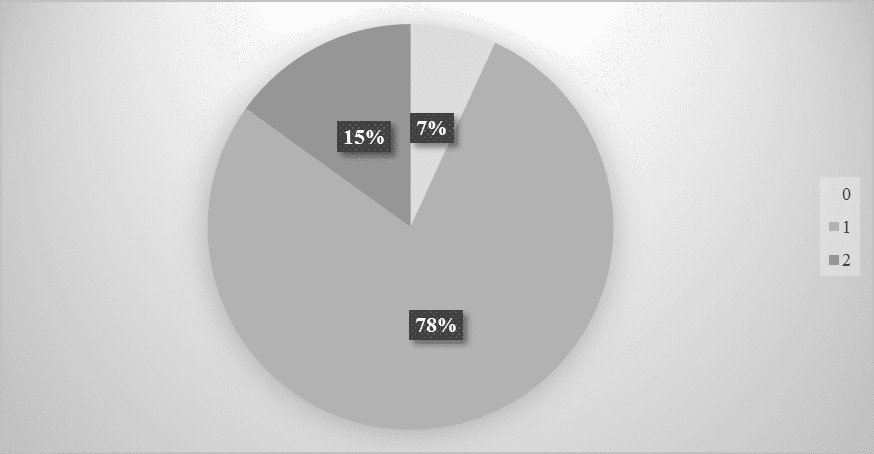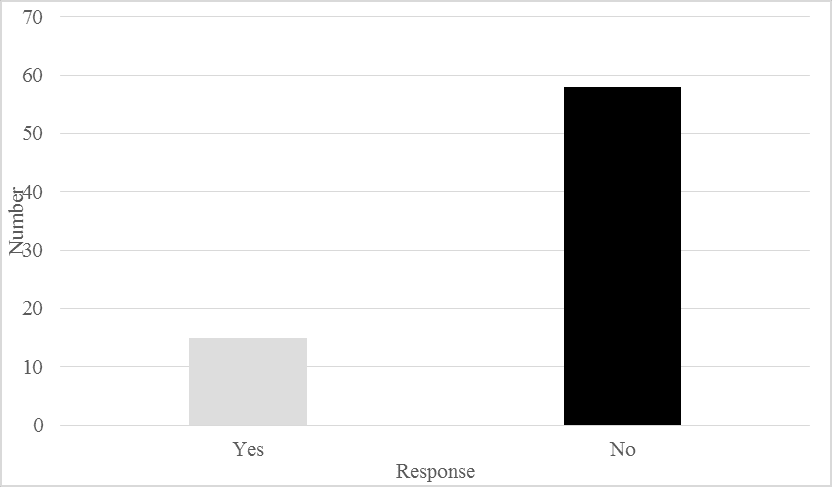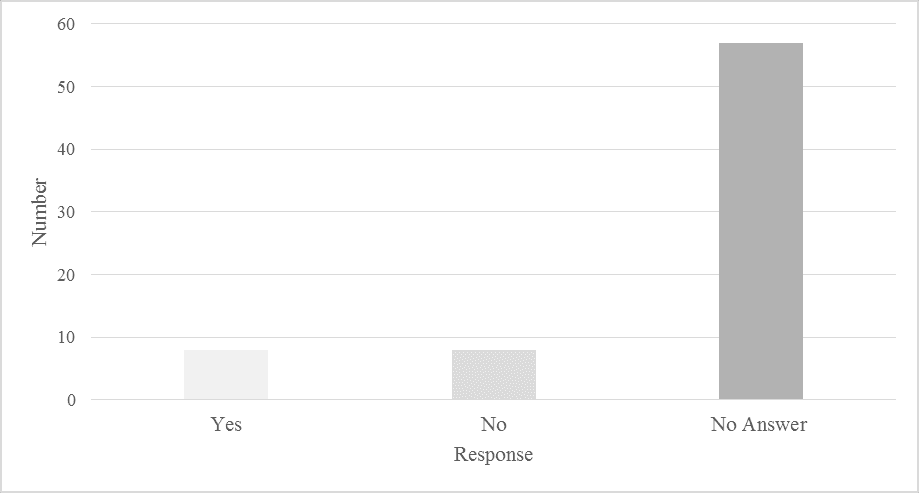What Beliefs and Preferences do Chinese Students have Regarding Appropriate Approaches when Dealing with Psychological Issues in GIC? A Mixed Method Research
Data Analysis
The data was subjected to univariate
and bivariate (correlation) analyses to establish a relationship between the
variables for quantitative data. The variables were coded as described in
Appendix A, and thematic analysis was used to identify and report themes within
qualitative data. As a result, the data was categorized into different themes: psychological issues, psychological methods, school counselling system,
benefits of schooling counselling system, seeking help, willingness to talk,
talk preference, and psychological improvement.
RESULTS
Quantitative
Data Analysis
56% of participants were females,
while 44% were males (Figure 1). Furthermore, Figure 2 indicates that
participants in the age brackets 22-25 were the majority, followed by 18-21.
Participants over 25 years old were the minority. More participants had
pre-master's than pre-undergraduate certificates (Figure 3). The most common
psychological issues affecting Chinese students in GIC are anxiety and stress,
followed by depression and eating disorders, as demonstrated in Figure 4.
Furthermore, Chinese students prefer Chinese traditional treatments for their
psychological issues (Figure 5). They also dislike the school counselling system
as a way of addressing their psychological matters (Figure 6). The majority
should have mentioned whether the school counselling system assisted, as
illustrated in Figure 7.
Figure
1: The number of female and male participants
Figure
2: Age distribution of participants
Figure
3: Educational level of participants
Figure 4: Showing the
common psychological issues affecting Chinese students in GIC
Figure 5: Demonstrating
methods Chinese students preferred to solve their psychological issues
Figure 6: Showing whether
Chinese students are using the school counselling system
Figure 7: Demonstrating
whether school counselling has worked for Chinese students in addressing their
psychological issues
Table 1: Relationship
between psychological issues and psychological methods and school counselling
system
|
|
Coefficients |
Standard Error |
t Stat |
P-value |
Lower 95% |
Upper 95% |
Lower 95.0% |
Upper 95.0% |
|
Intercept |
3.96772754 |
2.643710054 |
1.500818 |
0.1379 |
-1.3049859 |
9.240441 |
-1.3049859 |
9.24044099 |
|
Psychological
Methods |
0.08164783 |
1.095571828 |
0.0745253 |
0.940805 |
-2.10340128 |
2.2666969 |
-2.1034013 |
2.26669694 |
|
School
Counseling System |
1.73973825 |
1.249696183 |
1.392129 |
0.1682905 |
-0.75270219 |
4.2321787 |
-0.7527022 |
4.2321787 |
From
Table 1, Equation 1 describes the relationship between the dependent variables
(psychological issues) and independent variables (psychological methods and
school counselling system).
y=3.97+0.082*Psychological methods+1.740*School Counseling System Equation 1
Figure 8: Showing
regression line between psychological issues and psychological methods
Figure 9: Showing
regression line between psychological issues and the school counselling system
The
coefficient for the intercept is 3.97 and is associated with a p-value of 0.1379,
showing that it is not statistically significant at a p-value (0.05)(Equation
1). The coefficients for independent variables, psychological methods, and
school counselling systems are also 0.082 and 1.740, respectively. Consequently,
the p-value for psychological methods is 0.9408, while for the school
counselling system is 0.1683. These p-values are more excellent than 0.05,
demonstrating no significant relationship between psychological issues, the
school counselling systems, and psychological methods. Therefore, the findings
provide ground for retaining the null hypothesis, which shows no relationship
between psychological issues, psychological methods, and the school counselling
system.
Qualitative Data Analysis
Chinese
students are affected by different psychological issues, such as depression,
anxiety, eating disorders, and stress. However, fear is more prevalent than
psychological issues. Moreover, Chinese students prefer Chinese traditional
treatments to Western treatments for addressing their psychological issues
(Appendix C). A few participants indicated access to a school counselling system (15
appearances), while the majority reported no preference (58 appearances).
Additionally, few Chis Chinese students have benefited from the school
counselling system (Appendix C). The findings demonstrated that the majority of
Chinese students do not seek assistance whenever they encounter psychological
issues. Again, they prefer discussing psychological problems with their peers
compared to their parents, teachers, and medical professionals. Teachers are
the least preferred, followed by medical professionals when dealing with
psychological issues.
Furthermore,
participants emphasized addressing mental health issues within the school
environment. They suggested incorporating mental health education into the
curriculum, involving Chinese teachers to address cultural-specific concerns,
and collaborating with Chinese student organizations to support psychological
issues. Generally, the qualitative findings demonstrate the complex pattern of
psychological problems among Chinese students, the variety of coping strategies
employed, and the need for improved access to mental health support services
within the school setting. Furthermore, cultural considerations, such as
preferences for specific treatment methods and communication with Chinese
teachers, emerged as important factors in addressing psychological concerns
among the student population.
Appendices
Appendix
A: coding of variables
|
Uncoded Variables |
Coded Variables |
|
What
is your Nationality? |
Nationality
|
|
What
is your gender? |
Gender |
|
What
is the range of your age? |
Age |
|
What
is your degree? |
Educational
level |
|
What
psychological issues have you experienced while studying in GIC? |
CMI |
|
How
often do you find yourself struggling (e.g., academically or psychologically)
while studying at GIC? |
YES |
|
What
was your state of mind when you encountered difficulties in GIC? |
SM |
|
If
negative emotions, such as stress and anxiety, arise, do you actively seek to
address the issue? |
NESA |
|
(If
you answered yes to question 9) Would you prefer traditional Western or Chinese treatment? |
WNTT |
|
If
your negative feelings, such as stress and anxiety, arise, are you willing to
talk to others? |
WTO |
|
(If
you answered yes to question 11) Who do you prefer to talk to? |
PT |
|
Have
you ever used the school's counselling system for students? |
SCS |
|
(If
you answered yes to question 13) Do you think the school's counselling system
for students has worked for you? |
SCSW |
Appendix
B: Coding of sub-independent variables
|
Independent variables |
Coding |
|
CPI |
1 |
|
Depression |
2 |
|
Anxiety |
3 |
|
Stress |
4 |
|
Anxiety and stress |
5 |
|
Anxiety, stress, depression |
6 |
|
Anxiety, stress, eating disorder |
7 |
|
Anxiety and depression |
8 |
|
Eating disorder |
9 |
|
Stress, depression |
10 |
|
Depression, eating disorders,
stress, anxiety |
11 |
|
Eating disorders and anxiety |
12 |
|
Eating disorder, stress |
13 |
|
Stress and depression |
14 |
|
Stress, eating disorder, sleep
hard |
15 |
|
Suicidal thought |
16 |
|
None |
17 |
|
|
|
|
WNTT |
|
|
No answer |
0 |
|
Chinese traditional treatment |
1 |
|
Western treatment |
2 |
Appendix
C: Different themes identified
|
Themes |
Number
of appearances |
|
Psychological issues |
|
|
Depression
|
28 |
|
Eating
disorder |
29 |
|
Stress
|
57 |
|
Anxiety
|
59 |
|
|
|
|
Psychological methods |
|
|
Chinese
traditional treatment |
57 |
|
Western
treatment |
11 |
|
|
|
|
School Counseling System |
|
|
Yes |
15 |
|
No |
58 |
|
Benefits of School Counseling System |
|
|
Yes |
|
|
No |
8 |
|
|
8 |
|
|
|
|
Seeking for assistance |
|
|
Yes
|
7 |
|
No |
66 |
|
|
|
|
Willing to talk |
|
|
Yes |
67 |
|
No |
6 |
|
|
|
|
Talk Preference |
|
|
Peers |
41 |
|
Teachers |
1 |
|
Parents
|
18 |
|
Medical
professionals |
8 |
|
|
|
|
Improvement
in Addressing Psychological Issues |
Explanations |
|
Mental
health |
Most
Chinese students mentioned mental health on several occasions. As a result,
they provided different reasons for managing GIC to improve mental health. They
suggested including Chinese teachers in chatting with students to address
their psychological issues. Moreover, there is a need for GIC management to
collaborate with Chinese student organizations to solve their psychological
issues. |










Comments
Post a Comment